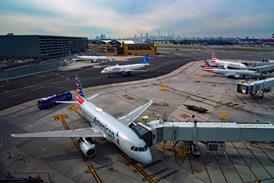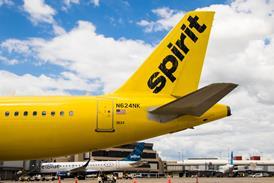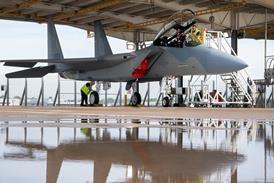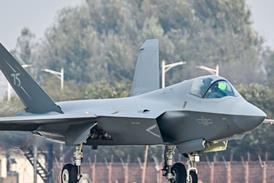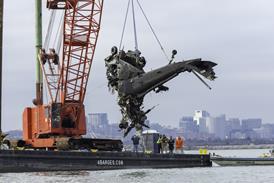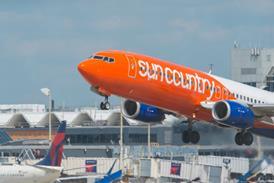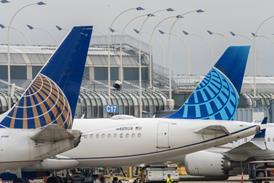Latvia’s government aims to retain at least a 25% interest in Air Baltic as the company prepares to open its capital to investors, but accepts that the carrier might have to give up some of its independence in order to flourish.
Speaking to FlightGlobal on 12 February, Latvian transport minister Kaspars Briskens stressed the benefits of Lufthansa’s recent agreement to take a convertible share in the airline ahead of a broader initial public offering.
“When we speak about European aviation consolidation, obviously we understand that Air Baltic has been more of an exception rather than the rule in terms of having maintained its independence – and also independence from any aviation alliance,” says Briskens.
“But at the same time, of course, we understand the direction in which European aviation is going.”
He hopes the IPO will attract a large number of investors, adding that “nothing prevents” Lufthansa “topping up” its shareholding.
If Air Baltic opts to expand and strengthen Latvian and Baltic connectivity, he says, a partner such as Lufthansa – which is a cornerstone member of Star Alliance – is “obviously a strategic asset”.
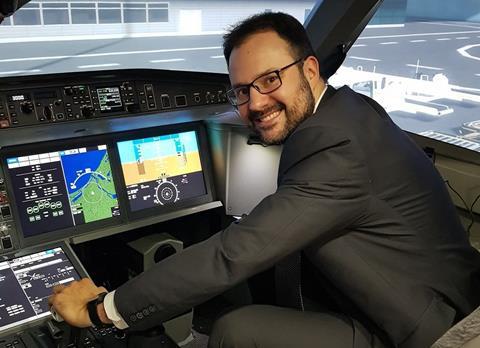
The government wants to retain a 25% shareholding, ensuring that the Latvian state stays closely connected to the company, not least because of its geographical position on the periphery of Europe. Briskens points out that Latvia does not have high-speed rail connections and the air transport link is a “critical element”.
“Even if Air Baltic becomes primarily owned by private investors, this will not change the strategic impact and importance that the Latvian government and the Latvian state affords to this important company,” he says.
The precise timing of the IPO, which has already been pushed back, has yet to be determined.
“From a practical perspective, all of the work has now already been done,” says Briskens. “The investment banks are on board, the consultants, the preparations are ongoing.”
He says the Air Baltic management team is “actively engaging” with potential investors, and the government is willing to proceed “at the earliest favourable window”.
“Aviation is obviously highly-sensitive to the different macroeconomic and geopolitical factors. But whenever such market conditions permit we would be ready to go,” says Briskens, adding that the IPO could take place as early as the end of the second quarter, or “perhaps…towards the end of the year”.
He says the government is “being patient” with the timing, because it wants to maximise the value of the carrier, adding: “I don’t think there’s urgency from the government’s perspective to list Air Baltic, whatever it takes, as soon as possible.”
The IPO will be undertaken with a single share class, rather than the four types of share used historically.
Finalising the Lufthansa agreement, says Briskens, was an “important prerequisite” of the IPO, and these negotiations took several months.
He describes the German carrier – with which Air Baltic already has a wet-lease pact – as a “highly-reputable, very experienced partner”.
“Having this presence of Lufthansa, the knowledge of Lufthansa at Air Baltic is very important,” he adds. “I think this also gives us an opportunity to grow together in the future.”
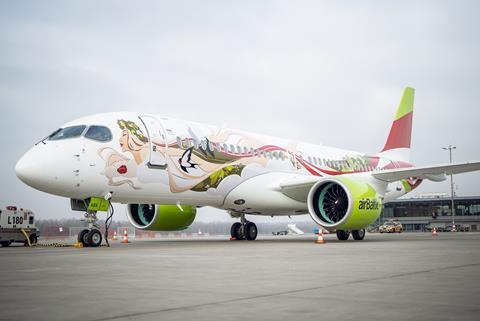
Air Baltic has newly introduced its 50th Airbus A220 and can provide maintenance services, as well as flight-training capabilities. Lufthansa Cargo opened a Riga connection last year.
Briskens believes Air Baltic offers Lufthansa qualities including punctuality, innovation and operational excellence, as well as the potential to develop other areas of co-operation besides the wet-lease arrangement.
While Air Baltic is having to cope with Pratt & Whitney engine issues – a situation which has forced it to cut back this year’s summer schedule – Briskens does not expect this to affect the IPO.
“I think the investors in the aviation industry have already priced-in the risk,” he says.
The engines are “marvellous”, he adds, but acknowledges the persistent snags. “We know that the issue is not going away tomorrow,” says Briskens, but adds that he has held discussions with Pratt & Whitney and “received assurances that they’re doing their best to resolve the situation”.
“We are very transparent about this issue,” he says, and Air Baltic has been “frank” about it.
When neighbouring Estonia was wrestling with the future of state-owned carrier Nordica, and considering a sale, the national auditor in 2023 said the government was not sufficiently capable of owning aviation businesses, particularly given the competitive environment and rules on state aid.
“I think we have gone quite far in terms of not allowing political interference into operational affairs of [Air Baltic],” says Briskens. “Everyone understands that this is a competitive industry. It’s a highly-specialised and knowledge-intensive industry.
“Because Latvia has been a shareholder of Air Baltic, I think company has had the operational autonomy to pursue its development. Of course, to go into expansion, to invest into new aircraft, it does require new capital.”
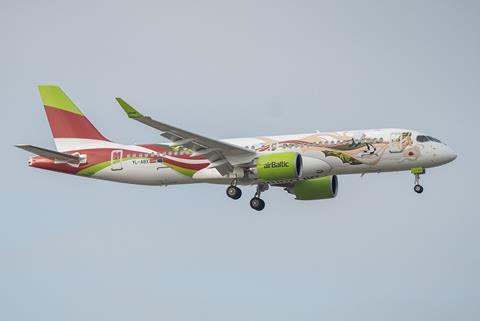
As part of the lead-up to the IPO, a new supervisory board was appointed on 11 February, with the election of investment manager Andrejs Martinovs and aviation operations specialist Lars Mydland, to join Lars Thuesen.
“These are individuals who have the necessary skills to take Air Baltic to this next stage of development,” says Briskens, who himself is a former member of the airline’s supervisory board.
With its operations in Tallinn and Vilnius complementing those in Riga, Air Baltic is already effectively the de facto carrier of the Baltic states.
The airline transported 8.3 million passengers last year – wet-lease included – and 5.2 million across its own bases, compared with a total population of 1.9 million in Latvia. Briskens says this shows the country is “kicking far above its weight class” in the aviation sector.
There is no immediate indication that either the Estonian or Lithuanian government will take part in the IPO.
“We have had some discussions regarding a potential participation,” he says. “This is not something that we are very actively discussing, but certainly all of the opportunities are there for any [Lithuanian or Estonian] entity to participate.
“But whatever happens, we will maintain our commitment to operating in Vilnius and Tallinn. These are core bases for Air Baltic and a significant share of our Baltic passengers come from [these cities].”

